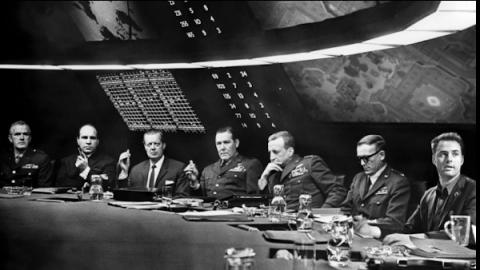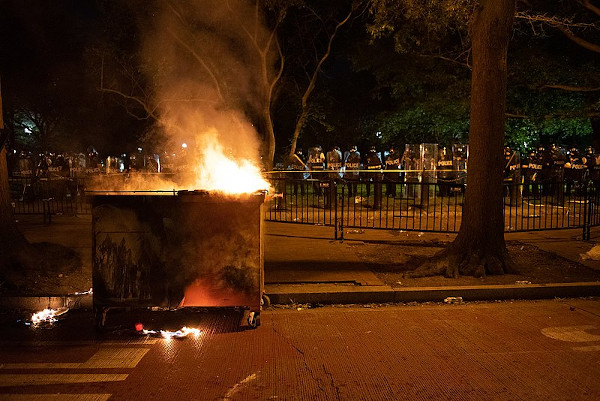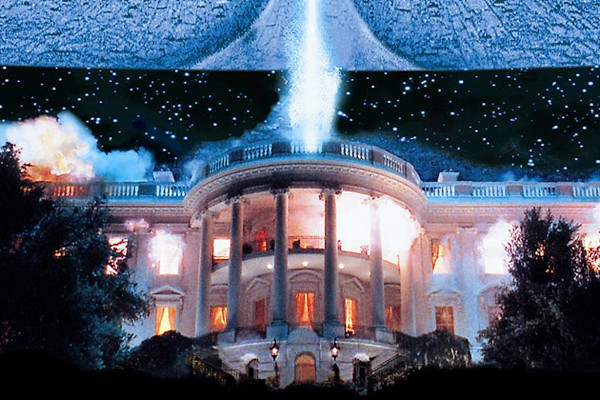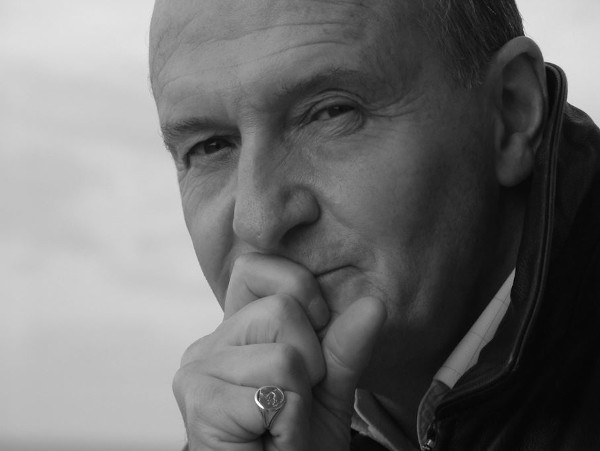‘1984’ Redux: New Dystopian Thriller Explores the Politics of Science and Religion

In his new book, Multiverse (Gritpoul), author Robert Mercer-Nairne transports us to a dystopian 2024, where the U.S. government is failing its citizens and the economy has collapsed. Each of the three political parties believes it has the solution: The dominant Rationalists look to science for answers; the Moralists and their leader President Dukes believe citizens have strayed too far from God and should use religion as their compass; while the Nationalists and their leader Milo Meadows III use drastic measures to gain power in Washington.
With a writing style influenced by George Orwell and Johann Wolfgang von Goethe, Mercer-Nairne uses well-crafted satire and jaw-dropping surprises to drive home his call for unity. The title, Multiverse alludes to the idea that when there is flux, small initial differences can lead to radically different results.
Excerpt: Chapter 4
“Dr. Preston, welcome to the White House. This is a rare pleasure!”
President Dukes was excited. The Reverend Richard Preston had become a legend whom he longed to meet. At over six foot two with a fine angular face and brindle hair, his youthful features and physical intensity were impossible to ignore. The pastor filled his church in Annapolis to bursting and was listened to by millions across the nation on his internet link God this day.
“Mr. President, Mrs. Dukes,” their guest acknowledged shaking their hands and presenting his helpmate, “my wife Abigail.” The pastor’s wife, a petite, attractive woman with raven black hair and a strong face, stepped forward to greet the presidential couple. “Let me assure you both,” Richard Preston insisted, “the pleasure is ours.”
The family dining room had an air of intimacy, but was still smart with rich red velvet curtains, yellow silk on the walls and a white carpet with blue swirls, chosen by Mrs. Dukes. Hanging above the sideboard opposite a marble fireplace and the gilt-framed mirror above it was Henry Ossawa Tanner’s Annunciation, on loan from the Philadelphia Museum of Art, depicting a woman in the presence of God’s messenger.
When they were seated the President invited his guest to say grace.
Richard Preston lent forward slightly, his hands clasped under his chin and his eyes fixed on the center of the table in deepest concentration.
“Almighty God,” he began, “bless this house, these people and this government and let us give thanks for what we are about to eat, knowing that there are a growing number in our great American family who are without. Through Your grace, help us to find a way out of this darkening nightmare and the will to lead our people to a better place. Amen.”
The President’s “well said” felt small and inappropriate and he wished he hadn’t said it.
“How was your drive here?” Mary Dukes enquired, turning to Abigail.
“Just under an hour,” she answered. “We encountered no disturbances. But the encampment in front of the White House is upsetting.”
“It grows every day,” the President told her. “I guess folk want to be near their government, near to me even, in the hope that we will do something.”
“Soup kitchens have been set up,” Mary explained, “so people are being fed. But winter is approaching and it can only get worse. It’s the children I worry about. We are trying to get a temporary school established.”
“Mary’s been tireless,” Henry affirmed. “She does things that matter. I sometimes feel that we politicians are just spinning our wheels.”
“I have a suggestion, Mr. President,” Richard Preston announced, “if you will allow me.”

“Goddamn it, pastor, I surely need suggestions,” the President responded, trying to ignore his wife’s look of disapproval at his turn of phrase, a look that made Abigail smile. “If you’ve got an idea, now is the time and here is the place.”
“The Food Stamp program is working. You have extended it indefinitely, or at least until this crisis is behind us. That’s good,” he said. “But the government must go further. People are losing their homes at an alarming rate. Women and children are ending up in sports halls, and many of the young men are running loose. As you would expect, criminality is on the rise.
“Just this week a mob entered our exclusive Epping Forest neighborhood and ran riot. The residents were terrified. The community police were called and two men were shot, but the rest ran off. There were no arrests. There are just too many footloose citizens for our police to cope. By the time the National Guard is called out, the disturbance has moved elsewhere.”
“Yes, I’m getting similar reports from across the country,” the President confirmed. “So what is your proposal pastor?”
“A home voucher scheme. The downward spiral must be stopped. People have to be kept in their homes.”
“Are you suggesting that the government underwrite the unemployed’s rent and mortgage payments?”
“Yes, I am.”
Henry Dukes let out a whistle as his mind grasped the enormity of the idea.
“I’d never get that through Congress,” he murmured, mostly to himself.
“Well, I think that’s an excellent idea,” Mary Dukes extolled. “People get to stay in their homes; banks and landlords are made whole; money is fed into the economy. It might just get us moving in the right direction again.”
“But the cost, Mary, the cost,” Henry muttered. “It would be frightening.”
“Isn’t where we are right now frightening, Mr. President?” interposed Abigail, in support of the sisterhood and her husband.
“Administering such a program would be dreadful,” the President calculated, still trying to grasp the full measure of what had been suggested. “This is public money we are talking about. Can you imagine the bureaucrat at the counter working out what claim was genuine and what claim was not? There would have to be rules and the whole thing would get bogged down before it had begun.”
“Well, I have a proposal there too, Mr. President,” Richard Preston advanced.
“Oh, alright, let’s hear it,” the President wearily invited.
“I propose that the entire home voucher scheme be administered through the churches.”
Henry Dukes sat in silence. One novel idea before bedtime was bad enough, but two: that invited extreme indigestion. Even Mary was speechless. It took Abigail to puncture the sound of pins dropping in the family dining room.

“Rules, Mr. President, can only ever take us so far. Commitment to the right path comes from belief. If the churches were to administer the home voucher scheme” – in Abigail’s mind it had already moved beyond an idea to an actuality – “the church community would know full well who was genuine and who was not.”
“I can see a rapid uptick in church attendance,” ventured the President.
“That’s as may be,” continued Abigail. “But if we want to rebuild communities, isn’t that exactly what we need?”
“I tell you, there will be more joy in heaven over one sinner who repents than over ninety-nine righteous persons who need no repentance –15 verse Luke 7.” The pastor’s words were delivered with a quiet force that arrested even the White House butler as he gathered up the plates from the first course.
Noticing this, the President turned to him.
“Well, what is your view, Matthew?”
“Between a tent on the White House lawn and my own home, Mr. President, I know which I’d prefer.”
“So there you are, Henry,” applauded Mary. “All you have to do is make it happen!”
“I’ll have to run this one by Senator Grasser,” ruminated Henry who was beginning to see some advantage in the idea. “If anyone could drive it though the senate, he could. The lower house is a different matter. Those boys and girls are running around like squawking fowl crying ‘the sky is falling, the sky is falling’ and I can’t get an iota of sense out of them. Someone needs to send a fox into that coop.”
“Then their sky would start falling,” remarked Mary.
And they probably wouldn’t realize until too late,” countered the President acidly. “They need to be frightened into right action and rewarded for taking it: heaven and hell. That’s where you come in, pastor.”
“When it comes to heaven and hell, I’ve always been more New Testament than Old, Mr. President: carrots over sticks.”
“We’re surely creating hell enough right here on Earth,” observed Mary, “without emphasizing another one. What we need is a way out.”
“Which is why bolstering the role of the churches makes sense,” urged Abigail. “People will come to see that faith in moral behavior is more important than economic advantage or disadvantage.”
President Dukes made a ‘note to self ’ that Hell was clearly his domain.
“So pastor,” he said, “do you think you could persuade the other churches to cooperate on such a scheme, if I could get Congress to approve it?”

Richard Preston might have been a man of God, but he also had an acute understanding of Man.
“It would have to be kept to the traditional denominations,” he answered. “Otherwise we’d have sects springing up everywhere. Factionalism has been religion’s curse.”
“You are surely not suggesting that the Reformation was a mistake now pastor, are you?” the President asked with just a hint of mischievousness.
“I’ll pass on that.”
“A most diplomatic answer!” the President conceded.
“What about those people who are not affiliated with any religion or denomination?” Mary asked.
“They’ll just have to pick one,” Abigail interposed. “Our purpose here is to rebuild God-centered, moral communities. Form is not the issue.”
“And those who don’t believe in God?” Mary wondered.
“Let’s leave them to the physicists,” the President chuckled.
“There will always be difficult issues, Mr. President,” Richard Preston conceded, “but I can tell you this. Our church will not turn away anyone in need. The parable of the Samaritan is at the heart of everything we do.”
Author Bio:
Lord Robert Mercer-Nairne is a critically-acclaimed, award-winning writer whose previous novels include The Letter Writer, Like No Other, Warlord, and The Storytellers: Metamorphosis. He is of American and Scottish decent, tracing his ancestry back to the French foreign Minister Talleyrand among other notable leaders. He currently resides in Scotland with his wife of 47 years. Learn more about Multiverse and his previous works on Gritpoul’s website: http://gritpoul.com/ .
Highbrow Magazine
Image Sources:
--Courtesy of the author
--Independence Day movie (20th Century Group)
--Dr. Strangelove or…How I Learned to Stop Worrying and Love the Bomb movie (Columbia Pictures)
--Rosa Pineda (Wikimedia, Creative Commons)































































































































































































































































































































